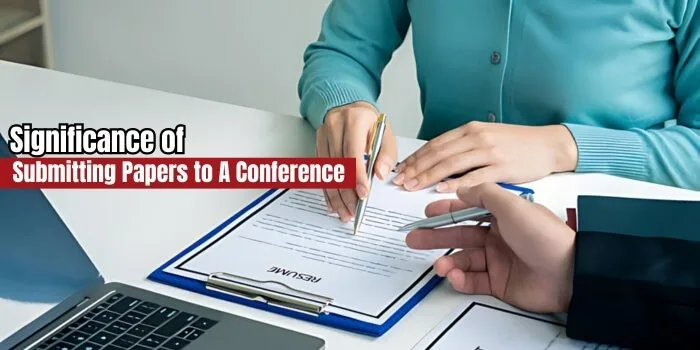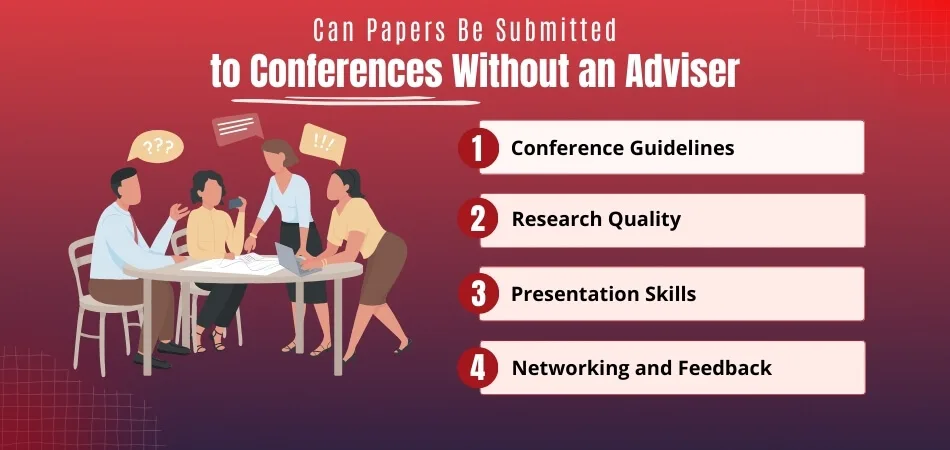For many researchers, submitting papers to conferences is an important milestone. It serves as a platform to share findings, network, and gain insights into their field’s latest developments. But a question often arises: “Is it possible to submit a paper to a conference without an adviser?”
Yes, in some cases. While the requirements can vary depending on the conference’s guidelines and your research’s nature, it is indeed feasible to go solo on this academic journey.
In this blog, we’ll dive deeper into the nuances of this process, providing clarity and guidance for those looking to make their mark independently. So, if you’re considering the possibility, stay with us as we explore the ins and outs of submitting your paper adviser-free.
Significance of Submitting Papers to A Conference
Submitting your work to a conference can be a game-changer for your academic career. It’s not just about sharing research; it’s an opportunity to get critical feedback from peers. This kind of exposure can lead to collaborations and even open doors to future opportunities.
Moreover, being active in conferences boosts your visibility within the academic community. It shows you’re engaged and contributing to your field’s discourse. Plus, the experience of presenting can sharpen your communication skills, which are invaluable in any career path.
Different Types of Papers Submitted at A Conference
Conferences serve as a melting pot for ideas, where researchers from various fields present their latest work. The types of papers submitted can vary widely, reflecting the diverse nature of academic inquiry. Here, we’ll explore the common types of papers you might encounter.
Research Papers
These are detailed studies reporting original research. They include methodology, data analysis, and discussion of results. Presenting these can lead to valuable feedback and potential collaboration. It’s the backbone of academic conferences, showcasing new discoveries.
Review Papers
Unlike research papers, review papers summarize existing literature on a specific topic. They offer an overview, identify trends, and suggest future research directions. This type helps attendees grasp the current state of research in a field. They’re crucial for setting the context.
Position Papers
Here, authors present an argument or stance on an issue relevant to their field. These papers spark debate and discussion at conferences. They’re less about presenting data and more about proposing ideas. Position papers challenge existing beliefs and encourage dialogue.
Case Studies
These papers detail specific instances of a phenomenon, process, or project. They provide in-depth analysis and real-world applications of theories. Attendees gain insights into practical aspects of academic concepts. Case studies bridge the gap between theory and practice.
The diversity of paper types at conferences enriches the event, making it a hub for learning and exchange. Whether you’re presenting a groundbreaking study or reviewing existing literature, your contribution plays a vital role in the academic community. Remember, each type of paper serves a unique purpose and adds to the collective knowledge pool.
Is it Possible to Submit a Paper to a Conference Without an Adviser?
Yes, it is indeed possible to submit a paper to a conference without an adviser. This pathway allows individuals to showcase their independent research and insights. However, it’s crucial to understand the conference guidelines and requirements before proceeding.
- Conference Guidelines: Each conference has its own set of rules for submission. Check if they require an adviser’s endorsement. Some may welcome independent researchers, while others might not. Understanding these rules is the first step in successful submission.
- Research Quality: Without an adviser, your research needs to stand on its own merits. Ensure your study is thorough, well-documented, and contributes significantly to the field. High-quality research is more likely to be accepted, adviser or no adviser.
- Presentation Skills: Presenting without an adviser means you’ll need to prepare extensively. Practice your presentation, understand your material inside out, and anticipate questions. Good presentation skills can compensate for the absence of an adviser.
- Networking and Feedback: Seek feedback from peers or mentors within your field before submission. Networking can provide valuable insights and improve your paper’s quality. Constructive criticism is crucial for refining your research and presentation.
Submitting a paper without an adviser is an attainable goal, provided you adhere to conference guidelines, ensure your research is robust, hone your presentation skills, and seek constructive feedback. This independent route can be a valuable learning experience and an opportunity to showcase your dedication and expertise.
How to Submit a Paper to a Conference without an Adviser?
Submitting a paper to a conference as an independent researcher can be a thrilling journey. It’s a chance to showcase your work and insights on a broader stage. However, the process requires careful planning and attention to detail.
Step 1: Research and Select a Conference
First, find a conference that aligns with your research interests and field. Review their themes, topics, and previous proceedings to ensure your work fits well. Consider deadlines, location, and participant demographics.
Step 2: Understand Submission Guidelines
Each conference has specific requirements for paper submissions. Read these guidelines thoroughly to understand format, length, and content expectations. Adhere to them meticulously to avoid rejection based on technicalities.
Step 3: Prepare Your Paper
Craft your paper according to the conference’s format and standards. Focus on clarity, coherence, and the contribution of your research to the field. Proofread for errors and ensure that your arguments are well-supported and articulated.
Step 4: Submit Your Proposal
Once your paper is ready, submit it through the conference’s designated submission system. Fill out any required forms and provide all requested information. Keep track of submission confirmations and any correspondence.
Step 5: Prepare for Presentation
If your paper is accepted, start preparing your presentation. Practice delivering your findings clearly and confidently. Prepare to answer questions and engage with your audience effectively.
Submitting a paper without an adviser requires diligence, research, and adherence to guidelines. By following these steps, you can navigate the process smoothly and make your independent research known. Remember, this is a fantastic opportunity to grow as a researcher and contributor to your field.
Benefits of Submitting a Paper to a Conference without an Adviser
Without an adviser, submitting a paper to a conference is difficult, but offers unique advantages. You get to show off your research skills and assert your independence. You can grow professionally and get recognition in your field with this approach. Here are some of the benefits of doing so:
Enhanced Autonomy
When you submit a paper independently, you steer the research direction and content. This autonomy encourages original thinking and problem-solving skills. You’re solely responsible for deadlines and revisions, which boosts time management skills. Ultimately, this independence can foster a strong sense of accomplishment.
Direct Networking Opportunities
Presenting your work without an adviser puts you directly in the spotlight. You become the primary contact for feedback, questions, and collaboration offers. This exposure can lead to meaningful professional relationships and opportunities. Networking as the sole author makes your efforts and capabilities more visible.
Increased Visibility
Independent submissions can enhance your reputation within the academic community. Being the sole author of a presentation showcases your commitment and expertise. This visibility can attract future collaborators or employers who value initiative and leadership. It’s a step toward establishing yourself as a subject matter expert.
Personal and Professional Growth
Making sense of the submission and presentation process alone accelerates learning and skill development. You’ll gain confidence in public speaking, critical thinking, and academic writing. Overcoming challenges without an adviser’s immediate help builds resilience and adaptability. These experiences contribute significantly to your professional and personal growth.
You can advance your academic and professional journey by submitting a paper to a conference without an adviser. Your skills and knowledge are challenged, leading to personal satisfaction and potential career opportunities. It might surprise you how much you can accomplish and grow by yourself.
Limitation of Submitting a Paper to a Conference without an Adviser
The experience of submitting a paper to a conference without an adviser can be empowering but challenging. It’s independent, but it has its limitations. Identifying these can help you prepare for the journey ahead. Here are the limitations:
Lack of Guidance
Without an adviser, you might miss out on expert feedback and direction. An adviser’s experience can help refine your arguments and highlight key points. This lack of mentorship can lead to missed opportunities for improvement. Navigating academic standards alone can be daunting.
Networking Challenges
Advisers often provide networking opportunities through their professional connections. Without this, you may find it harder to engage with other researchers and professionals. Building a network from scratch is challenging and time-consuming. This can limit your paper’s exposure and collaboration opportunities.
Funding and Resources
Often, advisers assist in securing funding for conference attendance and research activities. Without this support, you might face financial constraints. Access to resources like laboratories, libraries, or databases might be restricted. This can affect the quality of your research and presentation.
Feedback and Revision
Constructive criticism is crucial for improving academic work. Without an adviser, obtaining critical, informed feedback becomes harder. You might rely on less experienced peers for feedback, which may not be as insightful. This can result in a less polished final submission.
While submitting a paper without an adviser presents unique challenges, being aware of these limitations allows for better preparation. It requires proactive strategies for seeking feedback, networking, and managing resources. Embracing these challenges can lead to significant personal and professional growth, making your conference experience rewarding.
Frequently Asked Questions about Is it Possible to Submit a Paper to a Conference Without an Adviser?
When you are unfamiliar with the world of academic conferences, it can be challenging to get around, particularly if you do not have an adviser. We have compiled a list of frequently asked questions to help clarify the process and expectations when considering submitting a paper independently. Here they are:
How Do I Choose the Right Conference for My Paper if I Don’t Have an Adviser?
Research conferences that align with your study’s field and focus. Look for conferences with themes that match your research topic. Read past proceedings to understand the quality and type of research presented. Attend relevant workshops or seminars to gauge the conference’s relevance to your work.
What Challenges Might I Face when Submitting a Paper without An Adviser?
You may face challenges such as lack of feedback, difficulty in networking, and lesser guidance on the submission process. Overcoming these challenges requires proactive efforts in seeking feedback, utilizing online forums, and thoroughly understanding submission guidelines.
Are There Any Specific Preparations I Should Make when Submitting a Paper Without an Adviser?
Yes, conduct extensive research and ensure your paper is rigorously proofread. Seek feedback from peers or online academic communities. Understand the conference format and review successful past submissions. Practice your presentation skills in case your paper is accepted.
What Benefits Might I Experience by Submitting a Paper to A Conference without An Adviser?
Submitting independently can enhance your self-reliance and showcase your capability to conduct and present research on your own. It offers a unique opportunity to network, receive direct feedback, and gain visibility in your field without mediator influence.
Closing Remarks
A researcher’s dedication and drive shows through when they submit a paper to a conference independently. Is it possible to submit a paper to a conference without an adviser?
While this route may present unique challenges, such as a lack of guidance and networking hurdles, it offers unparalleled opportunities to grow, get visibility, and interact with scholarly community members directly. As a result, you’ll be able to push your academic and professional boundaries.








